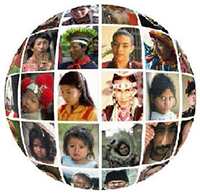
The International Day of the World's Indigenous People is celebrated in the first decade of August. It arose at the initiative of the UN General Assembly in 1994. The celebration is dedicated to the issues of preserving indigenous peoples on the planet, protecting their rights, cultural wealth, and heritage.
International Day of the World's Indigenous Peoples. According to UN estimates, indigenous peoples now comprise about 370 million people living in more than 70 countries.
There are no less than 5,000 different indigenous groups in the world. They represent various cultures of the existing diversity of our planet and over 4,000 languages out of the 6,700 known ones believed to exist today. Most of the indigenous languages are considered endangered.
The Amazon basin makes up about 7 percent of the world's surface area and contains more than half of the world's biodiversity. It is home to about 400 different indigenous groups.
Additionally, more than 100 pharmaceutical companies are funding projects to study the accumulated knowledge about native plants used by indigenous people for healing.
In virtue of rights to land and cultural survival, more than 50% of indigenous peoples already live in cities.
Despite cultural diversity and differences in lifestyles, indigenous peoples share similarities. These are different languages, the usual methods of conflict resolution, a special relationship with the land and its natural resources, traditional medicine, spiritual traditions, and rituals.
International Day of the World's Indigenous People was established on December 23, 1994, by the UN General Assembly, Resolution 49/214. On this day in 1992 was held the first meeting of the Working Group on Indigenous Peoples of the Sub-Commission on the Promotion and Protection of Human Rights.
On International Day of the World's Indigenous People, people pay tribute to the richness of indigenous people's cultures and the special contribution they make to the world's family. Also, people should be mindful of the enormous hardships that many indigenous peoples face, from unacceptable levels of poverty and disease to deprivation of property, discrimination, and denial of fundamental human rights.
The first International Decade of the World's Indigenous People, launched in 1995, has helped raise the voice of indigenous peoples around the world more clearly and raise awareness of indigenous peoples' concerns.
As the world entered the second decade, people should not forget that dialogue alone is not enough. There should be attention to action to protect the rights of indigenous peoples and to support the improvement of their situation in terms of their lands, languages, livelihoods, and cultures.
Source: en.unesco.org
Alfiya Kurmanaliyeva, librarian of the International Book Departmnet

